Adam Pollina is an American comic book artist and penciller. He is best known for his work on Marvel Comics' X-Force, Rise of Apocalypse, and Angel: Revelation, Charlemagne at Defiant, Rai: Fallen World, and Wrath of the Eternal Warrior #2 at Valiant, Loose Cannon and Big Daddy Danger at DC Comics, and Pyrate Queen from Bad Idea Comics.
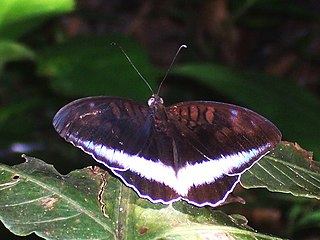
The Limenitidinae are a subfamily of butterflies that includes the admirals and relatives. The common names of many species and genera reference military ranks or – namely the Adoliadini – titles of nobility, in reference to these butterflies' large size, bold patterns, and dashing flight. In particular, the light stripe running lengthwise across the wings of many Limenitidini has reminded earlier authors of officers' shoulder marks and epaulets.

Adelpha californica, the California sister, is a species of butterfly in the family Nymphalidae. They are common in California, but can also be found in western Nevada and Oregon, as well as in northern Baja California. The upper surfaces of their wings are dark brown to black with wide cream white bands dissecting both wings and two orange patches near the tips of the forewings. The underside is variously colored with browns, blue, orange, and white. A. californica is unpalatable to predators and is part of a large mimicry complex.
Pollina is a comune (municipality) in the Metropolitan City of Palermo in the Italian region Sicily, located about 70 kilometres (43 mi) east of Palermo. As of 31 December 2004, it had a population of 3,102 and an area of 49.9 square kilometres (19.3 sq mi). Pollina probably occupies the site of the ancient city of Apollonia.

Anthony Pollina is an American politician who has served as Chair of the Vermont Progressive Party since 2017, and was as a member of the Vermont Senate from 2011 to 2023.

The 2008 Vermont gubernatorial election took place on November 4. Incumbent Republican Governor Jim Douglas won re-election to a fourth term. The gubernatorial primary took place on September 9, 2008.

Adelpha fessonia, the band-celled sister or Mexican sister, is a species of butterfly of the family Nymphalidae. It is found in Panama north through Central America to Mexico. It is a periodic resident in the lower Rio Grande Valley, Texas.

Adelpha is a genus of brush-footed butterflies found from the southern United States and Mexico to South America. They are commonly known as sisters, due to the white markings on their wings, which resemble a nun's habit. This genus is sometimes included with the admiral butterflies (Limenitis).

Adelpha bredowii, the Bredow's sister, is a species of butterfly in the family Nymphalidae. It is endemic to western, central, and southern Mexico. Adelpha bredowii belongs to the serpa species group in the genus Adelpha (sisters). Adelpha bredowii previously included two subspecies, the California sister and the Arizona sister. Recent phylogenetic studies, however, conclude that morphological, geographical, and genetic evidence make it clear that these are correctly separate species. They have been reclassified as the species Adelpha californica and Adelpha eulalia, respectively.
Antonio Domenico "Mr. Miggs" Pollina was an Italian-American mobster and was the short lived boss of the Philadelphia crime family during the late 1950s.
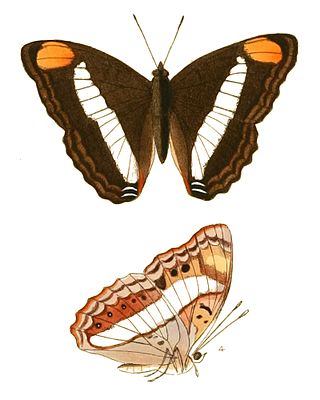
Doxocopa pavon, the Pavon emperor or Pavon, is a species of butterfly in the family Nymphalidae. They can be found from Paraguay in South America up to Texas in the southern United States. They are generally brown in their overall coloration, with two bands of white straddling the middle of the upper surfaces of the wings, and a patch of orange on the tips of their forewings. The upper surfaces of the wings of the males are overlaid by an iridescent blue-purple sheen. The females of the species closely resemble members of the unrelated genus Adelpha.

Adelpha eulalia, the Arizona sister, is a species of butterfly in the family Nymphalidae. It occurs from at least Guatemala and Mexico to the southwestern United States, including southeastern California, Arizona, New Mexico, and southern Texas. They can also sometimes be found in Oklahoma, Kansas, Colorado, Utah, and Nevada.
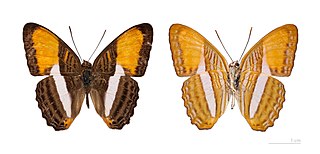
Adelpha cytherea, the smooth-banded sister, is a species of butterfly of the family Nymphalidae. It is found in the Central and South America.

Adelpha boreas, the gaudy sister or solitary sister, is a butterfly of the family Nymphalidae. It was described by Arthur Gardiner Butler in 1866. It is found from Costa Rica to Bolivia. The habitat consists of primary and disturbed rainforests and cloudforests at altitudes between 200 and 1,200 meters.
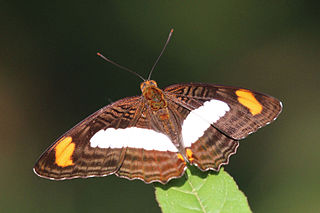
Adelpha iphiclus, the Iphiclus sister, is a butterfly of the family Nymphalidae. It was described by Carl Linnaeus in his 1758 10th edition of Systema Naturae. It is found in the tropics and sub-tropics of Central and South America, from Mexico to Bolivia. The habitat consists of disturbed areas in deciduous and evergreen forests at altitudes ranging from 0 to 1,200 meters.

Adelpha erotia, the Erotia sister, is a butterfly of the family Nymphalidae. It was described by William Chapman Hewitson in 1847.
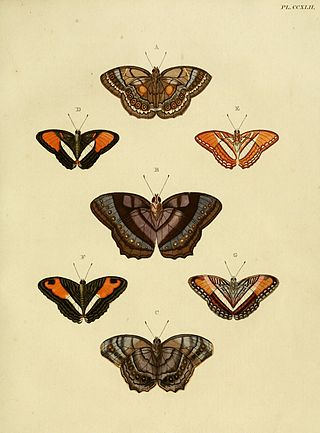
Adelpha cocala, the cocala sister or orange-washed sister, is a butterfly of the family Nymphalidae. It was described by Pieter Cramer in 1779. It is found from Honduras to Panama, Guatemala, Venezuela, Colombia, Suriname, Peru, Bolivia and Brazil.

Adelpha basiloides, the spot-celled sister, is a species of admirals, sisters in the family of butterflies known as Nymphalidae. It is found in North and Central America.













